Social-Political Issues
 |
 |
 |
 |
 |
 |
 |
Moscow’s Fifth Column - III
The German-Russian
Young Leaders Conference
Studying the Russian-sponsored gatherings of the European right in Vienna in 2014, (here and here), we see the Russian attempt to posture as the protector of European civilization against the deleterious morass of modern Liberalism. Yet there was more at work among the twenty-teens than the mere manipulation of the political right.
Deception is a complex game, and while the Russian-supremacist Dugin wined and dined the leaders of conservative Europe, Russian propagandists were busy at work with a scheme targeting a broad cross-section of German society. One group targeted in particular: The up-and-coming leaders of tomorrow’s Germany.
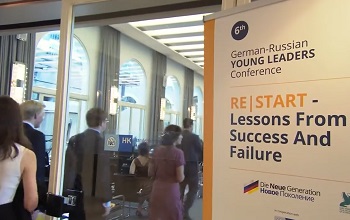 The German-Russian Young Leaders Conference was an annually held three-day-long event taking place alternately between Russia and Germany. Invitations were made to 120 young men and women from each country who were on track to become leaders in business, industry and politics. The ostensible goal of this gathering was to foster ties, deepen rapport, study technological innovations and cultivate dialogue between the two disparate countries.
The German-Russian Young Leaders Conference was an annually held three-day-long event taking place alternately between Russia and Germany. Invitations were made to 120 young men and women from each country who were on track to become leaders in business, industry and politics. The ostensible goal of this gathering was to foster ties, deepen rapport, study technological innovations and cultivate dialogue between the two disparate countries.
The meetings began in 2009 in the Russian embassy before expanding to larger and more formal settings. German-Russian relations shuddered when Russia invaded Ukraine in 2014, annexing Crimea, but it was not until the full-scale invasion of Ukraine proper in 2022 that the Conferences were cut entirely.
Now, with the clarity of hindsight, we can see the German-Russian Young Leaders Conference for what it really was.
European background
Germany remains the industrial driving force of Europe. With an economy that almost single-handedly sustains the EU and one of the most advanced technological sectors in the world, modern Germany has long been the envy of comparatively backwards Russia. Perhaps, then, it is no surprise that technology was prioritized in the workshops of the 2013 Conference that emphasized the future of data and automation while 2014 saw participants studying German developments in aircraft manufacturing and e-commerce.
In cultural rapprochement things were just as lopsided. Formal discussions between participants saw the Russians spreading doubts over the legitimacy of the Ukrainian government, but when Germans expressed concerns over the illegal annexation of Crimea by Russia their questions were often laughed off and left unanswered.
Many German attendees reported feeling an atmosphere of concession: Dialogue with Russia. Peace with Russia. Accommodate Russia. All this played out against the backdrop of lavish parties, dinners, dances and entertainment put on by Russian hosts.
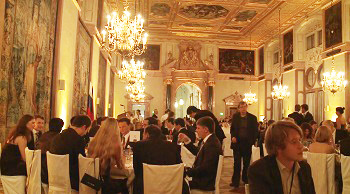
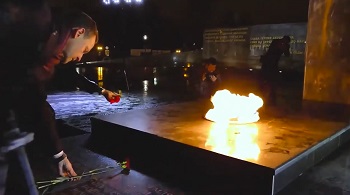 The atmosphere of opulence was deliberate. According to attendees the dinners were as rich as they were over-sized. Prestigious politicians and representatives from all over Russia attended to give participants a sense of aggrandizement.
The atmosphere of opulence was deliberate. According to attendees the dinners were as rich as they were over-sized. Prestigious politicians and representatives from all over Russia attended to give participants a sense of aggrandizement.
German politicians were present as well. Few at the time questioned the Russian businessmen, representing the sponsors of the Conference, who began to network with those same political leaders. Gerhard Schröder attended in 2010, important because he was the ex-Chancellor of Germany (1998-2005), but perhaps more ominously because after retiring from politics he began working for the Russian gas and energy giant Gazprom. The same Gazprom co-sponsored the Young Leaders Conference, funneling undisclosed amounts of money into charming its impressionable guests.
Bargaining with a bear
Schröder, as a prominent chairman of Gazprom, was the German link that allowed the Russian energy giant to sponsor not just the Young Leaders Conference, but also other similar events throughout Germany. Businessmen, politicians, students and cities were all flattered by the seemingly gregarious Russian hosts who kept the wheels of business well greased with lavish hospitality.
It seemed quite natural, then, that Germany would sign up to depend increasingly on Russian energy imports. Russia was buying its way into the German market.
Many raised concerns over the construction of the Nordstream 2 pipeline, a massive expansion on existing oil pipes. However Gazprom was hard at work flattering its way to approval of the project through the twenty-teens. Construction began in 2018 in no small part thanks to the networking done at these very same Young Leaders Conferences that saw German politicians mingling with the representatives of Russian big-energy.
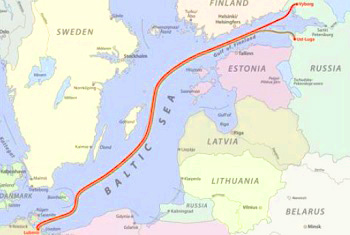 Construction finished in September of 2021. With the pipeline in place, Germany would be importing vast amounts of natural gas to power its energy and domestic sectors. As Germany unwisely heeded the demands of environmentalists to shut down its domestic nuclear energy sector without any compensation from other sources, Russia was all too happy to fill the gap.
Construction finished in September of 2021. With the pipeline in place, Germany would be importing vast amounts of natural gas to power its energy and domestic sectors. As Germany unwisely heeded the demands of environmentalists to shut down its domestic nuclear energy sector without any compensation from other sources, Russia was all too happy to fill the gap.
Germany began indulging its dependency on Russian gas. The stage was set for a German freeze the moment Russia decided to cut this now vital energy artery.
Cold turkey
As Russian troops poured across the Ukrainian border in February of 2022, suddenly the amiable Gazprom hospitality seemed not so friendly. Russia stood ready to ratchet back gas to any countries that voiced criticism over its second invasion in Ukraine. Energy would only continue to flow to dependent subjects if they assented to Russian military ambitions.
The breaking point was reached. For Christoph von Oldenburg, the chairman of the German-Russian Young Leaders Conference, the full invasion of Ukraine was too much. He announced his regret for the situation, and stated that Russia could not be excused. The ruse of the German-Russian Young Leaders Conference propaganda was over.
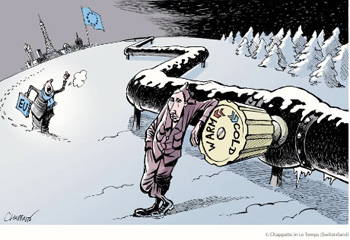 Germany severed its ties, shut down its end of the pipeline, and bore the suffering of the energy crisis from which it has yet to fully recover. The Russian gambit had failed.
Germany severed its ties, shut down its end of the pipeline, and bore the suffering of the energy crisis from which it has yet to fully recover. The Russian gambit had failed.
As the scramble to make up the shortfall of Russian gas has cost the EU hundreds of billions and sent gas prices skyrocketing to still record levels, the clarity of hindsight revealed the pattern of Russian subterfuge. The Young Leaders Conference was just one of many Russian seeds sewn in the hopes of a future dividend. Gazprom had been hard at work building an entire network of supportive organizations, lawyers, business and politicians all across Germany. Russian energy blackmail has been long in the making.
Thus, with the clarity of retrospection, we can see how the Young Leaders Conference was merely one instance of Russian manipulation among many. Over the course of several years Russia wooed German youths, fostered influence over businessmen and politicians, gleaned insights into German technology, and helped solidify German dependence on Russian energy. After all was said and done, the fabulous displays of hospitality and good will were a ruse to further Russian interests.
It was only when Russia played its hand that the illusion broke, and broke painfully.
Let this be a warning to those who believe in a reformed Russia appealing to conservatives as it paints itself as the savior of Western Civilization.
Continued
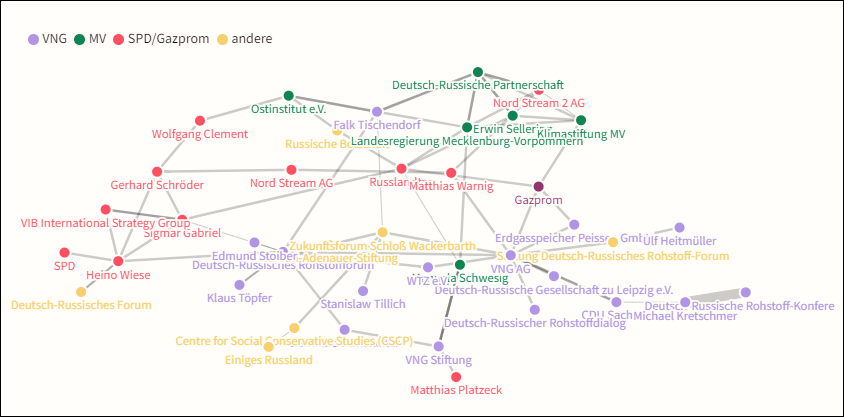

Deception is a complex game, and while the Russian-supremacist Dugin wined and dined the leaders of conservative Europe, Russian propagandists were busy at work with a scheme targeting a broad cross-section of German society. One group targeted in particular: The up-and-coming leaders of tomorrow’s Germany.

The 6th annual conference. Theme: ‘Restart’ relations following the 2014 invasion of Ukraine
The meetings began in 2009 in the Russian embassy before expanding to larger and more formal settings. German-Russian relations shuddered when Russia invaded Ukraine in 2014, annexing Crimea, but it was not until the full-scale invasion of Ukraine proper in 2022 that the Conferences were cut entirely.
Now, with the clarity of hindsight, we can see the German-Russian Young Leaders Conference for what it really was.
European background
Germany remains the industrial driving force of Europe. With an economy that almost single-handedly sustains the EU and one of the most advanced technological sectors in the world, modern Germany has long been the envy of comparatively backwards Russia. Perhaps, then, it is no surprise that technology was prioritized in the workshops of the 2013 Conference that emphasized the future of data and automation while 2014 saw participants studying German developments in aircraft manufacturing and e-commerce.
In cultural rapprochement things were just as lopsided. Formal discussions between participants saw the Russians spreading doubts over the legitimacy of the Ukrainian government, but when Germans expressed concerns over the illegal annexation of Crimea by Russia their questions were often laughed off and left unanswered.
Many German attendees reported feeling an atmosphere of concession: Dialogue with Russia. Peace with Russia. Accommodate Russia. All this played out against the backdrop of lavish parties, dinners, dances and entertainment put on by Russian hosts.

Guests were treated lavishly, above, but induced to leave flowers at a tomb to Russian soldiers, below

German politicians were present as well. Few at the time questioned the Russian businessmen, representing the sponsors of the Conference, who began to network with those same political leaders. Gerhard Schröder attended in 2010, important because he was the ex-Chancellor of Germany (1998-2005), but perhaps more ominously because after retiring from politics he began working for the Russian gas and energy giant Gazprom. The same Gazprom co-sponsored the Young Leaders Conference, funneling undisclosed amounts of money into charming its impressionable guests.
Bargaining with a bear
Schröder, as a prominent chairman of Gazprom, was the German link that allowed the Russian energy giant to sponsor not just the Young Leaders Conference, but also other similar events throughout Germany. Businessmen, politicians, students and cities were all flattered by the seemingly gregarious Russian hosts who kept the wheels of business well greased with lavish hospitality.
It seemed quite natural, then, that Germany would sign up to depend increasingly on Russian energy imports. Russia was buying its way into the German market.
Many raised concerns over the construction of the Nordstream 2 pipeline, a massive expansion on existing oil pipes. However Gazprom was hard at work flattering its way to approval of the project through the twenty-teens. Construction began in 2018 in no small part thanks to the networking done at these very same Young Leaders Conferences that saw German politicians mingling with the representatives of Russian big-energy.

Nord Stream 2 pipeline created German gas dependency
Germany began indulging its dependency on Russian gas. The stage was set for a German freeze the moment Russia decided to cut this now vital energy artery.
Cold turkey
As Russian troops poured across the Ukrainian border in February of 2022, suddenly the amiable Gazprom hospitality seemed not so friendly. Russia stood ready to ratchet back gas to any countries that voiced criticism over its second invasion in Ukraine. Energy would only continue to flow to dependent subjects if they assented to Russian military ambitions.
The breaking point was reached. For Christoph von Oldenburg, the chairman of the German-Russian Young Leaders Conference, the full invasion of Ukraine was too much. He announced his regret for the situation, and stated that Russia could not be excused. The ruse of the German-Russian Young Leaders Conference propaganda was over.

Gazprom gave Putin leverage over Europe
As the scramble to make up the shortfall of Russian gas has cost the EU hundreds of billions and sent gas prices skyrocketing to still record levels, the clarity of hindsight revealed the pattern of Russian subterfuge. The Young Leaders Conference was just one of many Russian seeds sewn in the hopes of a future dividend. Gazprom had been hard at work building an entire network of supportive organizations, lawyers, business and politicians all across Germany. Russian energy blackmail has been long in the making.
Thus, with the clarity of retrospection, we can see how the Young Leaders Conference was merely one instance of Russian manipulation among many. Over the course of several years Russia wooed German youths, fostered influence over businessmen and politicians, gleaned insights into German technology, and helped solidify German dependence on Russian energy. After all was said and done, the fabulous displays of hospitality and good will were a ruse to further Russian interests.
It was only when Russia played its hand that the illusion broke, and broke painfully.
Let this be a warning to those who believe in a reformed Russia appealing to conservatives as it paints itself as the savior of Western Civilization.
Continued

Diagram of German groups & leaders affiliated with Gazprom

Posted November 8, 2023
______________________
______________________
 Volume I |
 Volume II |
 Volume III |
 Volume IV |
 Volume V |
 Volume VI |
 Volume VII |
 Volume VIII |
 Volume IX |
 Volume X |
 Volume XI |
 Special Edition |


